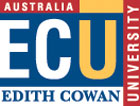Bachelor of Education (Secondary) (Music Education)
Bachelor of Education (Secondary) (Music Education)
Focuses on classroom music teaching. Students have the option to complete a minor in instrumental music teaching and conducting/ensemble direction, and can also undertake electives in primary and early childhood music teaching. The major is offered in conjunction with the Western Australian Academy of Performing Arts (WAAPA) and students undertaking…
Categories
COURSE DESCRIPTION
Focuses on classroom music teaching.
Students have the option to complete a minor in instrumental music teaching and conducting/ensemble direction, and can also undertake electives in primary and early childhood music teaching. The major is offered in conjunction with the Western Australian Academy of Performing Arts (WAAPA) and students undertaking this major opt to specialise in either Classical, Jazz or Contemporary music. Under certain circumstances, students may undertake crossover units from other streams.
Learning Outcomes
Demonstrate broad and coherent knowledge in depth regarding the Australian curriculum and teaching strategies for secondary music education.
Review, analyse and synthesise knowledge of teaching strategies to plan for the content of music teaching.
Exercise critical thinking and judgement to plan and implement music programs for a range of students with diverse abilities and needs, and assess the outcomes.
Communicate knowledge and ideas clearly in both written and oral formats.
Demonstrate leadership, exercise professional judgement and collaborate to plan, problem solve and make decisions in music.
Adapt knowledge and skills in diverse contexts to create positive learning environments in music.
Critically reflect using accredited standards, mentor feedback and the ECA Code of Ethics to demonstrate responsibility and accountability and plan for continued collaborative and autonomous professional learning and development.
Career Opportunities
Employment opportunities
Graduates will be eligible to seek employment in both government and non-government secondary schools teaching Music, and have the option to also work as a primary school specialist music teacher.
Possible future job titles
Music education, School music teacher, Music specialist, Instrumental teacher.
REQUIREMENTS
There are various ways to meet our admission requirements, such as:
Secondary school results
Successful completion of one year of tertiary study from a recognised institution
Completed Diploma program from a recognised institution
English competency requirements:
International students must attain an IELTS Academic with an average level of 7.5 or more, across the four components of listening, speaking, reading and writing; no score below level 7.0 in any of these components; and a score of 8.0 or more in the components of speaking and listening.
TOEFL iBT: 70 (no individual score less than 17)
TOEFL Paper-Based Test (PBT): Minimum score of 550, including Test of Written English of 5 or better. (Results are typically valid for only 2 years.)
Pearson Test of English (PTE) Academic: 52, with no scores less than 50. (Results are typically valid for only two years.)
EDUCATIONAL INSTITUTION
Edith Cowan University (ECU) is a large, multi-campus institution serving communities in Western Australia and internationally.ECU was awarded university status in 1991, but despite its relative youth, the University has a proud history of more than a century of service to education in Western Australia and is recognised for its teaching and learning, excellence in research, and partnerships with the community.We have more than 23,300 students, including around 18,500 undergraduates and 4,800 postgraduates. Approximately 3,600 international students attend the University, originating from 104 countries.We are a progressive University with courses developed through ongoing industry input, and employing lecturers who engage fully with their students. We’re a university that knows while knowledge is important, understanding comes from experience –experience that enables you to adapt what you’ve learned to whatever opportunities come your way. Because that’s when you do more than just survive in this world. You thrive in it.




